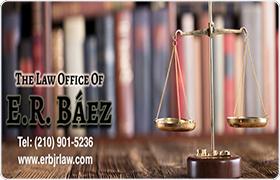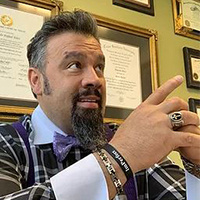Adkins Criminal Lawyer, Texas, page 6
Sponsored Law Firm
-
 x
x

Click For More Info:
-
The Law Office of E.R. Báez
700 N. Saint Mary's Street Suite 1400 San Antonio, TX 78205» view mapCriminal Defense Law The Pastor Lawyer
Every client is special to us and every client will be treated with respect and dignity. No matter how difficult the case may be, Mr. Báez will treat you with the upmost dignity.
800-903-7181
Adam Alden Campbell
Bankruptcy, Criminal, Family Law, Estate Planning, Wills
Status: In Good Standing *Status is reviewed annually. For latest information visit here
Talia Lorraine Nye
Criminal, Government, Lawsuit & Dispute
Status: In Good Standing *Status is reviewed annually. For latest information visit here Licensed: 17 Years
Brad Simon
Military, Criminal
Status: In Good Standing *Status is reviewed annually. For latest information visit here
Cameron T Cooke
Family Law, Criminal, Insurance, Personal Injury
Status: In Good Standing *Status is reviewed annually. For latest information visit here
Joseph Hoelscher
White Collar Crime, Felony, DUI-DWI, Criminal
Status: In Good Standing *Status is reviewed annually. For latest information visit here Licensed: 18 Years
FREE CONSULTATION
CONTACTFREE CONSULTATION
CONTACTJames L. Bruner
Business, Criminal, Lawsuit & Dispute, Real Estate
Status: In Good Standing *Status is reviewed annually. For latest information visit here
C. Larry Mathews
Criminal, Science, Technology & Internet, Intellectual Property
Status: In Good Standing *Status is reviewed annually. For latest information visit here Licensed: 57 Years
John Gilbert Perez
Criminal, Felony, DUI-DWI
Status: In Good Standing *Status is reviewed annually. For latest information visit here Licensed: 11 Years
Tina Tussay-cooper
Criminal
Status: In Good Standing *Status is reviewed annually. For latest information visit here Licensed: 42 Years
 E.R. Báez San Antonio, TX
E.R. Báez San Antonio, TX Practice AreasExpertise
Practice AreasExpertise